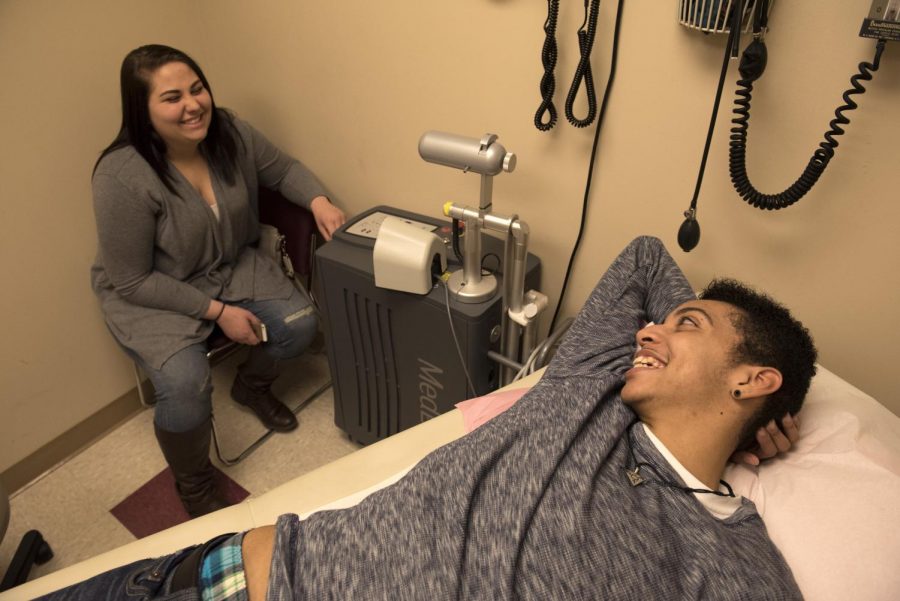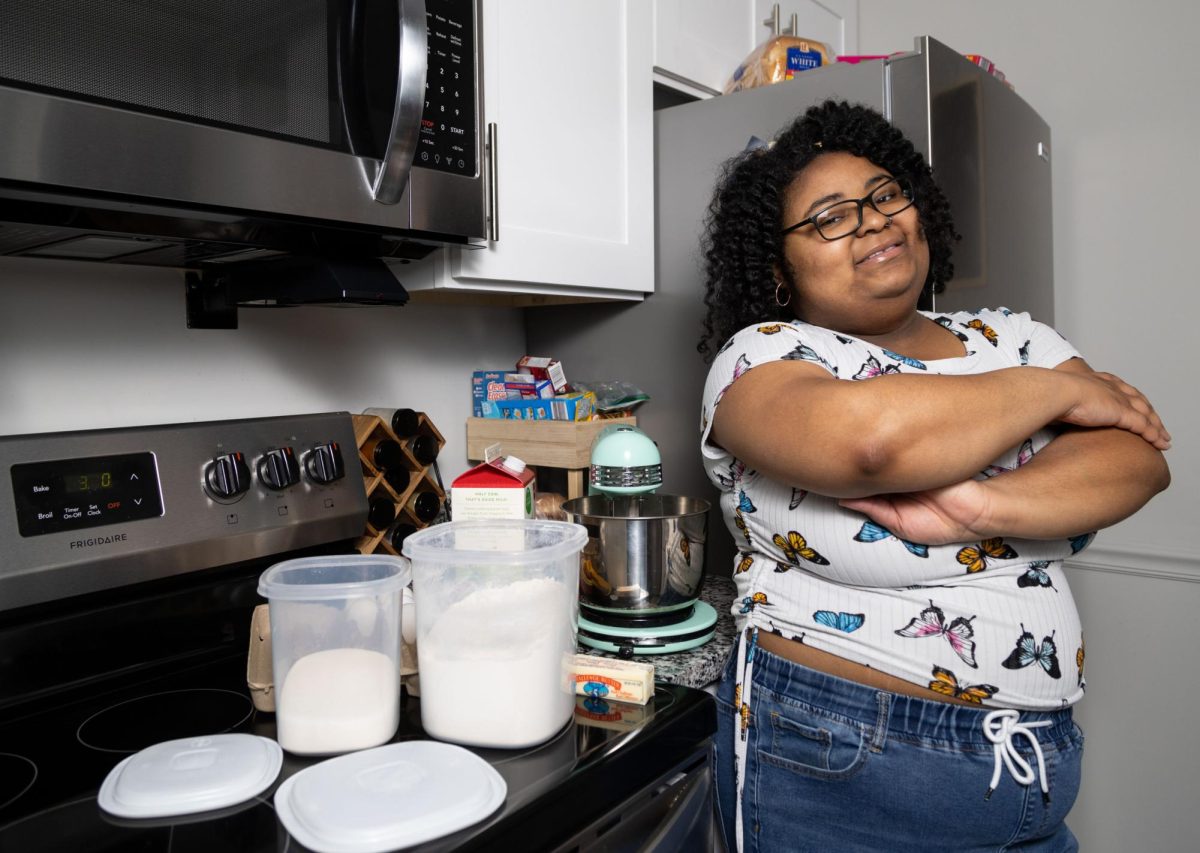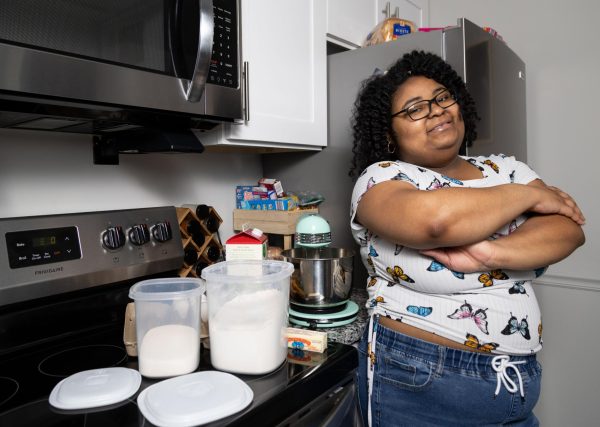Student tackles injustices, transphobia
April 12, 2016
Finding Alex
Alex Miller never felt female. Ever.
Something had always felt off. When he looked in the mirror, Miller felt lost; the reflection was foreign.
In October, Miller finally related to a word that encapsulates his essence and identity: transgender.
Coming to terms with his identity was a long process, but now the fear of bullying, the fear of not “passing” as male and the fear of the exorbitant costs associated with transitioning weighs on his mind everyday.
Miller, a transgender male and Chattanooga senior, said college has been a constant process of discovery. He developed a passion for marching band, found a job he loved in the athletics department and declared a major in broadcasting.
“I’ve done a lot of things that many college students haven’t gotten to do, including discovering myself,” Miller said.
Although having come out as a lesbian last summer, Miller felt this identifier was not an accurate representation of his authentic self. After meeting his current girlfriend, Courtney Smith, 18, of Bowling Green, the pieces started coming together.
“I’ve known something was off this whole time,” Miller said. “I couldn’t pinpoint [it], until I met people who were like me.”
Since October, Miller has been in the early stages of his transition.
Miller said he began gender therapy in February, a legal requirement before he could receive testosterone. However, because there is not any form of gender therapy services in Bowling Green, Miller completed sessions with a licensed gender therapist via Skype.
With one obstacle out of the way, Miller started testosterone injections in March, a process that is helping Miller learn to love his body.
“When I look at myself in the mirror, I hate knowing that I have female parts and I’m not female,” he said.
Miller said coming to terms with his identity and learning to love himself was not an easy task. However, starting testosterone has been exciting.
“Initially, it was just like sheer excitement,” he said. “I was so excited. I could feel the [testosterone] in my leg … it’s been a long time coming.”
Miller said he hopes testosterone will alleviate some of his fears.
One of his greatest fears is going to the bathroom.
“My greatest fear is to be discovered and being jumped in the bathroom and no one can help me,” Miller said. “I’m too weak to defend myself.”
While Miller is glad WKU made the step in the right direction with adding all-gender restrooms to campus, he said he wishes the all-gender bathrooms were in more buildings.
“It’s such a huge deal,” Miller said. “I can’t go into the [womens’ restroom], and I don’t feel comfortable going into the [mens’ restroom] all the time. It just depends on how busy it is. If it’s class change, I will not go to the bathroom.”
Miller said being out at his job also presents its own set of challenges.
“At work, I’ve had to have long, drawn-out, individual conversations with every single person,” he said. “They just don’t understand. I can’t blame them because a lot of stuff that I know about [being transgender], I’ve had to research, but if they’ve never met anyone who’s like me, they don’t have to go online. They can just ask me.”
With graduation inching closer, Miller was worried he wouldn’t be able to legally change his name in time so his diploma would have his preferred name and not the name given to him at birth.
“There were a lot of hoops to jump through,” Miller said.
Miller said the process is usually a lot slower, but because he was in a hurry to get everything changed before graduation, the process sped up.
“Everything normally takes much longer,” he said. “I was determined to get it done now, or I would have regretted it.”
Tiffany Robinson, university registrar, said currently enrolled students can change their name by submitting a name change form, which is located on the registrar’s website, and a copy of their social security card with the updated name.
Robinson said the documentation needed to make the name change can differ depending on the university, but having a method for students to change their name is a standard business practice.
While students need to have their names changed legally for them to be reflected in the system, students can identify a preferred name specifically for their diploma.
It’s not her life. It took me three and a half years to realize that. It’s not my mom’s life, and I’m completely independent. It feels so good to be the authentic me.
“The name change form has a section for diploma name change,” Robinson said in an email. “Their name in the program and on any other University documents would still be listed as the legal name. I am currently working on a preferred name policy.”
Miller said besides the hoops he had to jump through to get his name changed, WKU lacks resources for LGBT students and, more specifically, for transgender students. Miller said just having someone to talk to would be nice, but also having resources such as pamphlets and counseling would help.
It’s not her life. It took me three and a half years to realize that. It’s not my mom’s life, and I’m completely independent. It feels so good to be the authentic me.
Miller said an option for gender-neutral housing would benefit transgender students who choose to live on campus. While Miller has previously lived on campus, he wasn’t out at the time. However, he said if he was out, he would not have felt comfortable being forced to live in an all female dorm.
No university in Kentucky offers gender-neutral housing, according to campuspride.org. However, the University of Louisville implemented apartment-style living with the theme of celebrating LGBT identity and social living in 2012.
LGBT students — even if they don’t live on campus — face discrimination when renting. In Kentucky, there is no law or ordinance protecting members of the LGBT community from discrimination.
According to the most recent report of the National Transgender Discrimination Survey, out of 6,450 transgender and gender nonconforming persons in the United States and U.S. territories, 19 percent of respondents expressing a transgender identity or gender nonconformity in higher education reported being denied access to gender-appropriate housing. Five percent were denied campus housing altogether. Eleven percent lost or could not get financial aid or scholarships because of gender identity or expression.
Bowling Green junior Vynne Montgomery is gender nonconforming.
“Gender presentation is something I try to correlate with my feeling,” they said. “Gender is what I project to the world and how I feel most comfortable in the world. I feel quite comfortable being something that is not explicitly male or female.”
Montgomery said a lot of people have a lack of understanding regarding gender nonconforming and transgender issues. This lack of understanding often leads to hostile environments, they said.
Montgomery wants to see society, including WKU’s society, create a safe space for gender nonconforming and transgender students by providing more LGBT programming, educational resources and diversity training.
“The things [WKU] is already doing, they can make them more prevalent,” Montgomery said.
Transgender and gender nonconforming persons are more likely to be harassed and bullied, leading to a higher rate of persons who attempt suicide within those populations. Among college graduates, 33 percent have attempted suicide; for transgender and gender nonconforming persons who did not attend college, the rate is much higher.
Miller is not immune to harassment. The obstacles he faces always stem from being defined by his body parts, he said. One encounter at his job even pushed Miller to tears.
“There was a girl I worked with, and she refused to call me by male pronouns,” he said. “She [said], ‘You’re still a girl if you have a pussy.’”
Miller also lacked support from his mother. His mother isn’t aware of his transgender identity, but he had first come out to his mother as lesbian.
“It’s hard enough for her,” Miller said. “I didn’t want to have another coming out because she never came to terms with the first one … I’m just doing this on my own, and when she wants to come back into my life, this is who she’s going to see.”
If it wasn’t for Miller’s support group, including his girlfriend, the inclusive community of the marching band and groups dedicated to transgender persons on Facebook, he said he wouldn’t know what to do.
“I have an amazing girlfriend,” he said. “I don’t know how I can do anything without her.”
Smith said she’s proud to see Miller grow and become more comfortable with himself. Miller’s identity as a transgender male didn’t stop Smith from loving him, because, while Miller’s identity as a transgender man is a large part of who he is, Smith said he is much more than his gender.
“I fell in love with Alex because of his personality and the way he treats people and of how kind he is,” Smith said. “I don’t see myself being with anyone else.”
Miller said it’s freeing to know he has his own voice now and can finally live life as his authentic self.
“I don’t have to put my happiness on hold so that my mom will be happy,” Miller said. “It’s not her life. It took me three and a half years to realize that. It’s not my mom’s life, and I’m completely independent. It feels so good to be the authentic me.”


























